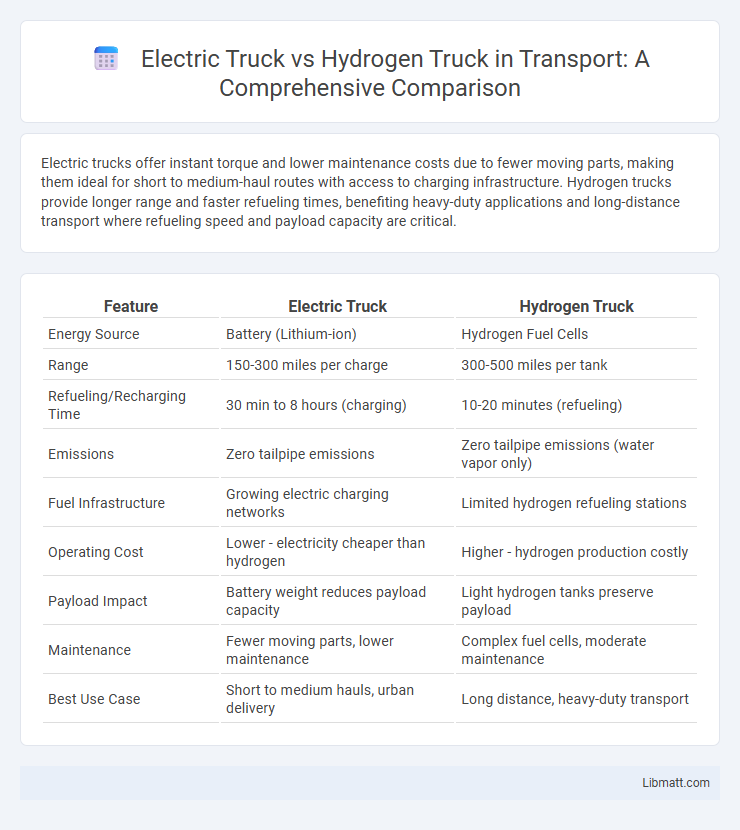Electric trucks offer instant torque and lower maintenance costs due to fewer moving parts, making them ideal for short to medium-haul routes with access to charging infrastructure. Hydrogen trucks provide longer range and faster refueling times, benefiting heavy-duty applications and long-distance transport where refueling speed and payload capacity are critical.
Table of Comparison
| Feature | Electric Truck | Hydrogen Truck |
|---|---|---|
| Energy Source | Battery (Lithium-ion) | Hydrogen Fuel Cells |
| Range | 150-300 miles per charge | 300-500 miles per tank |
| Refueling/Recharging Time | 30 min to 8 hours (charging) | 10-20 minutes (refueling) |
| Emissions | Zero tailpipe emissions | Zero tailpipe emissions (water vapor only) |
| Fuel Infrastructure | Growing electric charging networks | Limited hydrogen refueling stations |
| Operating Cost | Lower - electricity cheaper than hydrogen | Higher - hydrogen production costly |
| Payload Impact | Battery weight reduces payload capacity | Light hydrogen tanks preserve payload |
| Maintenance | Fewer moving parts, lower maintenance | Complex fuel cells, moderate maintenance |
| Best Use Case | Short to medium hauls, urban delivery | Long distance, heavy-duty transport |
Introduction: Electric vs Hydrogen Trucks
Electric trucks offer zero-emission transportation with high energy efficiency and established charging infrastructure, making them ideal for urban deliveries and short-haul routes. Hydrogen trucks provide longer range, faster refueling times, and suitability for heavy-duty or long-distance freight, leveraging hydrogen fuel cells that emit only water vapor. Your choice between electric and hydrogen trucks depends on route length, energy availability, and operational requirements.
Energy Efficiency Comparison
Electric trucks demonstrate higher energy efficiency by converting over 85% of electrical energy from the grid into vehicle movement, while hydrogen trucks typically achieve around 30-40% efficiency due to energy losses in hydrogen production, compression, and fuel cell conversion. Electric drivetrains offer superior performance in urban and short-haul applications, where regenerative braking further enhances efficiency. Hydrogen trucks provide advantages in long-haul scenarios requiring quick refueling and extended range but remain less efficient in direct energy usage compared to battery-electric counterparts.
Refueling and Charging Infrastructure
Electric trucks rely on an expanding network of fast-charging stations, which currently offer quicker energy replenishment at urban hubs but may require longer charging times during extended routes. Hydrogen trucks benefit from rapid refueling capabilities comparable to diesel, supported by a growing but still limited network of hydrogen fueling stations primarily located along major highways. Your choice between electric and hydrogen trucks depends largely on the availability and convenience of refueling or charging infrastructure tailored to your operational routes.
Range and Performance Analysis
Electric trucks typically offer ranges between 150 to 300 miles per charge, with high torque enabling rapid acceleration and efficient performance in urban settings. Hydrogen trucks can achieve longer ranges exceeding 300 miles and faster refueling times under 20 minutes, making them suitable for heavy-duty, long-haul applications. Performance efficiency varies with payload and terrain, where hydrogen vehicles maintain consistent range in colder climates compared to electric trucks whose battery performance may degrade.
Environmental Impact Assessment
Electric trucks produce zero tailpipe emissions, significantly reducing air pollutants and greenhouse gases compared to hydrogen trucks, which rely on hydrogen production methods that can vary in environmental impact. Hydrogen trucks emit only water vapor during operation, but the environmental benefits depend on whether the hydrogen is sourced from renewable energy or fossil fuels. Your choice impacts the overall carbon footprint, with electric trucks currently leading in lifecycle emissions efficiency due to advancements in battery technology and cleaner electricity grids.
Cost of Ownership and Maintenance
Electric trucks generally offer lower cost of ownership due to fewer moving parts, reduced maintenance requirements, and lower energy costs compared to hydrogen trucks. Hydrogen trucks involve higher upfront expenses related to fuel cell technology and infrastructure, with maintenance costs driven by complex fuel cell systems and hydrogen storage components. Battery electric trucks benefit from a rapidly expanding charging network, while hydrogen refueling stations remain limited and expensive to install, impacting total ownership expenses.
Payload and Cargo Capacity
Electric trucks generally have a lower payload capacity due to the heavy battery packs that reduce available cargo space and increase vehicle weight. Hydrogen trucks benefit from lighter fuel storage systems, allowing for higher payload and cargo capacity, which is crucial for long-haul transportation. Your choice between electric and hydrogen trucks should consider the trade-off between energy storage weight and cargo efficiency for optimal operational performance.
Commercial Availability and Models
Electric trucks dominate commercial availability with established models like Tesla Semi, Rivian R1T, and Freightliner eCascadia widely accessible for various freight applications. Hydrogen trucks, such as the Toyota Mirai and Nikola Two, are emerging but remain limited in market presence due to infrastructure challenges and higher costs. Your choice depends on fleet needs, with electric trucks offering more immediate deployment options and hydrogen trucks positioned for future long-range and heavy-duty performance.
Future Trends and Technological Advancements
Electric and hydrogen trucks are rapidly evolving, with electric trucks benefiting from improved battery energy densities and faster charging infrastructures, enhancing range and operational efficiency. Hydrogen trucks are advancing through breakthroughs in fuel cell technology and the expansion of hydrogen refueling stations, promoting longer driving ranges and quicker refueling times compared to battery-electric models. Future trends indicate a hybrid approach leveraging both battery electric and hydrogen fuel cells to optimize performance, reduce emissions, and meet diverse logistics demands.
Conclusion: Which Truck Is Right for You?
Choosing between electric and hydrogen trucks depends on your specific needs: electric trucks excel in urban deliveries with shorter ranges and lower operating costs, while hydrogen trucks offer longer range and faster refueling ideal for heavy-duty and long-haul routes. Consider infrastructure availability--electric charging stations are widespread, but hydrogen refueling stations remain limited. Evaluate total cost of ownership, payload needs, and route characteristics to determine the best fit for your fleet.
electric truck vs hydrogen truck Infographic

 libmatt.com
libmatt.com